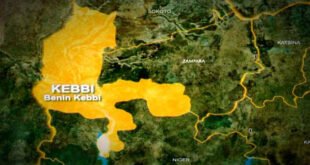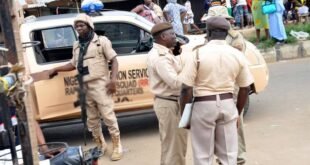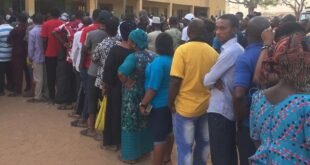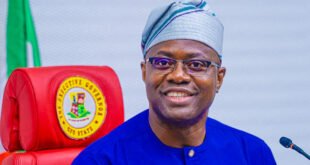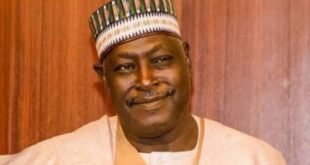[Inside Stuff With MARTINS OLOJA, The Guardian, June 7, 2025, Back Page]
… I regard Local Government election as a significant process because it should ordinarily be the most critical election to the people. The reason isn’t far-fetched: It is the closest level of government to the people. That is where destiny of the real constituents who employ our leaders begin to be shaped. We can’t easily have dialogue with the Governors and even Commissioners. But we should be able to have direct access to the Council Chairman and Councilors at any time. They most times don’t live in GRAs. They should live among the people. I call the new Chairman of my Local Government Council in Irele, Ondo Southern Senatorial District, Hon. Jide Akinfe and he always answers me even around midnight. He answers queries and requests for help from local people like that. That is how governance should be in a democracy. We can’t have direct access to the Governors about local and even state matters all the time.
This is actually one of the reasons an iconic politician in the United States, Tipp O’Neil once made a simple statement through his book titled, “All Politics Is Local: And Other Rules of the Game”, that has become a buzzword in America that has elevated Mayoralty to remarkable heights. That is where you find that the Mayor of New York City appears more influential than the Governor of New York State, for instance. The NYC Mayor’s budget can trump the Governor’s. We will later discuss the significance of that word on marble (All politics is local) that has attracted even so many doctoral theses.
Let us get to the brass tacks of today’s topic: ‘Voter Education, Civic Competence and Participatory Democracy in Nigeria.” So let me confess that as a journalist who began life as a trained teacher and now a leader in media industry, I have covered nine Heads of state/Presidents, monitored the highest level of government, written extensively on democracy and elections in Africa’s most populous country, for more than 37 years, I would like say in all humility that I am thrilled all the chairmen and commissioners have come together to deconstruct and give meaning to political recruitment of the most significant tier of government that most political journalists hardly cover. Most stories we read in the media and on the archives about local government elections are negative vibes from the Centre. Even the Chairman of INEC didn’t spare the states’ election management agencies in hi welcome address when the executive members of FOSIECON visited him on May 22, 2024.
Voters in Nigeria need civic education for many reasons:
1. Informed decision-making: Education enables voters to make informed decisions about candidates, parties, and policies.
2. Critical thinking: Education promotes critical thinking, helping voters to evaluate information, identify biases, and recognize misinformation.
3. Civic engagement: Education fosters civic engagement, encouraging voters to participate in the democratic process and hold leaders accountable.
4. Political literacy: Education improves political literacy, helping voters understand political systems, processes, and institutions.
5. Media literacy: Education helps voters critically evaluate media sources, identify propaganda, and recognise disinformation.
6. Empowerment: Education empowers voters to demand their rights, challenge oppression, and advocate for their interests.
7. Reduced manipulation: Education reduces the risk of voters being manipulated by politicians, propaganda, or disinformation.
8. Better representation: Education leads to better representation, as informed voters elect representatives who truly represent their interests.
9. Democratic consolidation: Education contributes to democratic consolidation, helping to establish a stable and resilient democratic system.
10. Economic development: Education is linked to economic development, and informed voters can make decisions that promote economic growth and prosperity.
In summary, voter education is crucial in developing democracies to ensure informed, engaged, and empowered citizens who can effectively participate in the democratic process.
Election Stakeholders in participatory/representative democracy:
Election stakeholders are individuals, groups, or organisations that have a vested interest in the electoral process and its outcomes. They play various roles in ensuring the integrity, transparency, and fairness of elections. Here are some key stakeholders:
Voters: Citizens who participate in the electoral process by casting their ballots.
Political Parties: Organizations that nominate candidates and campaign for election.
Candidates: Individuals running for office.
Election Administrators: Officials responsible for organising and conducting elections.
Civil Society Organisations: Groups that promote voter education, election observation, and advocacy.
Media: Outlets that provide information and coverage of the electoral process.
International Observers: Organisations that monitor elections to ensure fairness and transparency.
Donors and Funders: Individuals or organisations that provide financial support to candidates or parties.
Community Leaders: Influential individuals who can mobilise support for candidates or parties.
Election Observers: Domestic or international organisations that monitor the electoral process.
These stakeholders interact and influence one another, shaping the electoral process and its outcomes. By understanding their roles and interests, we can better appreciate the complexities of elections and work towards ensuring free, fair, and credible processes.
Civic Competence
The World Bank Institute defines “Civic Competence” as the ability of citizens to participate effectively in the democratic process and hold their governments accountable. Civic competence encompasses:
1. Knowledge: Understanding of democratic principles, institutions, laws, and policies.
2. Skills: Critical thinking, problem solving, communication, and advocacy.
3. Values: Tolerance, respect for diversity, and commitment to democratic principles.
4. Attitudes: Active citizenship, civic engagement, and willingness to participate.
5. Behaviors: Voting, volunteering, community involvement, and demanding accountability.
Civic competence enables citizens to:
1. Make informed decisions
2. Participate in policy debates
3. Hold elected officials accountable
4. Advocate for their rights
5. Engage in constructive dialogue
6. Build coalitions and partnerships
7. Monitor government performance
8. Demand transparency and accountability
The World Bank Institute emphasises civic competence as essential for:
1. Effective governance
2. Democratic consolidation
3. Economic development
4. Social justice
5. Human rights protection
To promote civic competence, the World Bank Institute supports initiatives such as:
1. Civic education programmes
2. Voter education campaigns
3. Community engagement projects
4. Leadership development programmes
5. Access to information and media literacy initiatives
6. Policy advocacy and research
7. Capacity building for civil society organisations
By fostering civic competence, the World Bank Institute aims to strengthen democratic institutions, promote inclusive governance, and improve development outcomes.
Some Deliverables:
Let’s imbibe these remarkable discussion points on Local Government Elections without any fear of usurpation of the powers of States’ Independent Electoral Commissions by some confused principalities and powers in Abuja who speak in tongues about competitive federalism. They can’t shut the door on Federalism anymore. Even the power sector has obtained constitutional endorsement as it has been removed from the Exclusive Legislative List: States are now setting up the Ministry of Power/Energy. There is no power here on earth that can confront an idea whose time has come: the States Independent Electoral Commissions (SIECs) have come to stay. Amotekun has come to stay. Local Government fiscal autonomy has come to stay within the construct of federalism. State police will soon join.
But let’s not be docile to consume dangerous assumptions that things will never change in Nigeria. Let the State Independent Electoral Commissions (SIECs) leaders continue to introduce reforms that will accommodate successful people and even professors who will be obtaining forms to contest elections into Local Government Councils sooner than later. Don’t mind the saboteurs, the powers that are delaying the landmark judgment of the Supreme Court. They may delay its implementation but they can’t stop the door that God has opened through the highest court in the land. The ancient word I know tells me that when God opens a door, no man, yes no man can shut!
INEC with due respect didn’t conduct perfect elections in 2019 and 2023. Why should INEC or any other federal body be made to conduct local government elections in Nigeria? Have they read Tipp O’Neills ‘thesis’ on “All politics is local”? Have they read The Guardian Federalist Papers (2023), a book containing 61 strategic editorials on ‘Federalism Is the Answer”?
Here is the highlight of the whole matter: The political party leaders should begin to borrow from the spiritual brilliance of Apostle Paul of Tarsus by setting off their transformation by the renewing of their minds on voter education and civic competence.
Political Parties Need Ideological Reform Agenda
The political parties should reform to allow welfare and security of the people to be primary purpose of government or die. If they continue the way they are going without attracting significant members, not just voters who will help them to reform their ideological barrenness, they will surely die as money alone can’t answer all their political things.
Youth and Wakeup Call
To the young ones, and the wailing elite who don’t vote, it is a time to stop lamenting and read the warning of an iconic South African freedom fighter, Steve Biko, about complacency and faith in God without work. Biko warned:
‘I would like to remind the black ministry, and indeed all black people, that God is not in the habit of coming down from heaven to solve people’s problems on earth’. Biko, the legend is just advising us today too that we should take responsibility for creating change and so divine intervention shouldn’t be relied upon to solve earthly problems. He wants us to learn this: that empowerment and liberation from poverty and oppression we lament about on the social media can only come through collective action, not divine intervention alone. He wants us to take action and mobilise for change we desire. And this can only begin with the power of our votes.
All told, we should tell those who desperately want federalism but want OSIEC and others to be scrapped what Tipp O’Neill meant by his classic: ‘All politics is local: Tip O’Neill’s famous phrase “All politics is local” means that politicians’ success hinges on their ability to address local concerns and issues. Essentially, even national policies are ultimately judged by how they impact individuals and communities at the local level.
Think about it – when voters head to the polls, they’re often thinking about how the candidates’ policies will affect their daily lives, their neighborhoods, and their communities. Will that new highway project improve their commute? Will the proposed healthcare plan help their family? These local concerns drive voting decisions more than abstract national issues. That seals the power and essence of local government elections.
O’Neill’s own experience as a congressman from Massachusetts and later as U.S Speaker of the House, reinforced this idea. He saw how national policies played out differently in various local contexts and how effective politicians needed to understand and respond to those local needs.
In practice, “all politics is local” means politicians must:
*Understand local concerns: Listen to voters’ worries and priorities.
*Address local issues: Develop policies that tackle specific community problems.
– *Build local support: Foster relationships with local leaders, organisations, and constituents. By focusing on local politics, politicians can build trust, credibility, and a strong foundation for their campaigns. And that’s exactly what O’Neill meant by the remarkable phrase, “All politics is local’. That should be the last take way…
**The above is an excerpt from a paper I presented at the Forum of State Independent Electoral Commissions in Nigeria (FOSIECON) National Delegates Conference 2025, At The Crispan Hotel, Jos, Plateau State, 22 May, 2025.
To be continued…
Stay ahead with the latest updates!
Join The ConclaveNG on WhatsApp and Telegram for real-time news alerts, breaking stories, and exclusive content delivered straight to your phone. Don’t miss a headline — subscribe now!
 JamzNG Latest News, Gist, Entertainment in Nigeria
JamzNG Latest News, Gist, Entertainment in Nigeria
